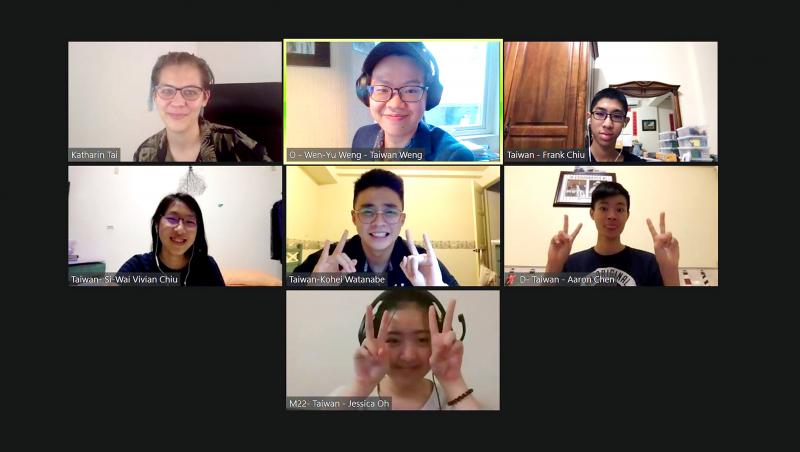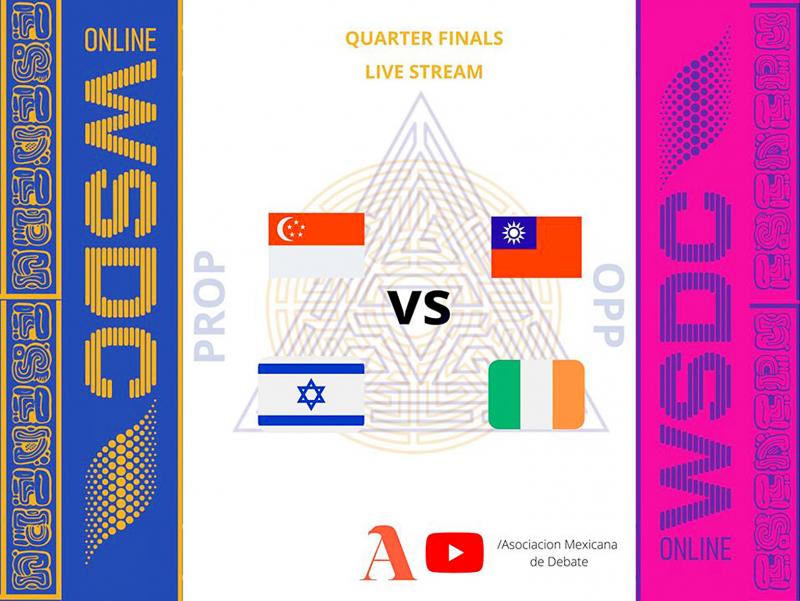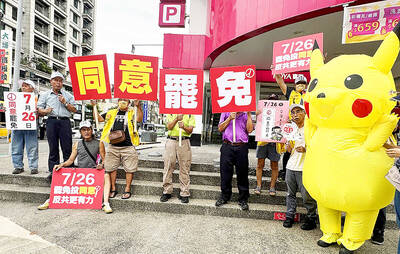Frank Chiu (趙思源) felt intimidated at first when facing off against his idol debate team.
Unlike Team Taiwan, which was only established in 2014, Team Singapore has participated in the World Schools Debate Championships (WSDC) since 1995, claiming top honors in 2011, 2015 and 2017.
After an intense debate over the topic of whether to distribute emergency and humanitarian aid through non-state groups linked to terrorism, Singapore still came out on top.

Photo courtesy of Taiwan Debate Union
“You feel that these teams are unbeatable,” Chiu says “Once we got into the quarterfinals, I figured [Singapore] would destroy us. But in the actual round, we kept it close. It was a lot of fun.”
Despite their loss, reaching the quarterfinals marked fledgling Team Taiwan’s best showing ever, beating the Netherlands in the octofinals and finishing with a higher overall score than the perennial favorites of the UK and India.
WSDC is the world’s largest high-school level English-language debate tournament with 67 countries participating this year. Canada ended up winning the debate this year, in a tournament was supposed to be held in Mexico City, but due to COVID-19 it was conducted online between July 17 and Aug 2.

Photo courtesy of Taiwan Debate Union
The virtual format made the tournament more accessible, leading to a record number of participating teams this year.
“[The online format] also gave us an advantage in being able to communicate during the rounds without the other side hearing you,” Team Taiwan member Kohei Watanabe quips.
Team Taiwan’s head coach, Weng Wen-yu (翁文妤), says that competitive debating not only sharpens students’ English speaking and critical thinking abilities, which is still lacking in traditional education, it also offers skills such as leadership, teamwork, how to work under pressure and respond to failure.
“Besides the fact that [Taiwanese students] aren’t given a lot of ways to think critically and express themselves, they’re also not teaching students these soft skills,” Weng says. “Is our education really gearing students up to succeed?”
TRAINING FROM SCRATCH
Weng had a nontraditional educational journey, growing up in Thailand and attending university at the age of 15. She now works in London, but her concern for Taiwan’s youth led the accomplished debater to found the nonprofit Taiwan Debate Union (TDU) in 2014, which trains junior high and high school students through rigorous intersquad practice and competing in tournaments around the world. Due to COVID-19, more tournaments this year were held online, which allowed the students to gain experience without having to travel.
TDU started with eight students, but has since grown to 30 members chosen out of over 100 applicants. “We maintain a pretty large program so our debaters can keep practicing against each other, even though the final team is only five people,” Weng says.
Weng sees TDU as the main trainer for the high school debate circuit. Unlike other countries with more established debating scenes, TDU often trains its students from scratch for years before they are ready for the big stage.
“There are high schools with their own debating clubs, but since debating is a bit new in Taiwan, few schools have alumni coaches who can help out,” she says. “A lot of people are on their own or trying to get into our program for more intensive support.”
What’s more impressive is that the competitors are not native English speakers, although Chiu and Watanabe both attend bilingual high schools. Weng says that those attracted to English debate generally have a decent command of the language, and she doesn’t think that it puts them at too much of a disadvantage since they face the same challenge as the numerous teams from non-English speaking countries.
“The example I like to give is … if I go around asking people in Taiwan whether they are comfortable debating in Chinese, probably a lot of them will say no,” Weng says. “Debating requires a whole other level of how to weaponize your language and push arguments in a succinct but persuasive matter. That is a skillset that requires intensive training regardless whether you’re a native or second-language speaker.”
While interest is growing quickly, Weng says it’s not always easy to convince Taiwanese parents that this is something worthwhile.
“If it’s not something that helps their kids get better grades or get into a better university, they tend to write it off really quickly,” she says. “With the future so incredibly uncertain, some of the best ways to invest your time is to focus on soft skills that are relevant regardless of what job you’re in and what the future economy looks like.”
RIGOROUS TRAINING
Chiu says the key to success is simply rigorous preparation that they do all year. During the tournament, they wake up early every day to train for the rounds in the afternoon. After the bout, they listen to an hour of feedback from the judges and another hour from the coaches, and continue preparing late into the night.
“Then we wake up, rinse and repeat. Honestly, it was pretty mentally straining,” Watanabe says.
He adds that one of the most crucial strategies is to throw their best material to the first speaker to ensure a strong start.
“It sounds obvious but it’s instinctively difficult to do,” Weng says. “When you’re going second or third, you have a survival instinct to keep some material to yourself so your speech won’t suffer. It’s about fighting against the individual instinct and thinking about the broader team strategy.”
Watanabe, who turns 17 next month, says that after several years in TDU, the biggest takeaway is that he’s learned to be more introspective.
“After each round, it’s not about winning or losing, but about getting feedback,” he says. “[This mentality] extends outside debate. I’m more introspective about the way I treat other people, talk to teachers and handle my academics.”
Chiu, who just turned 18, enjoys the adrenaline rush of competition and adds that debate has taught him to question everything he sees.
“We look at something and normally we just assume that it’s true,” he says. “But afterward you analyze it and start feeling that there’s something wrong, and you start gaining more perspectives on different issues.”
But most of all, they enjoy the camaraderie, even with the opponents they meet in the tournaments.
“The best part of debating is being able to interact with various types of people from around the world. Our Taiwanese team, we hang out a lot too. It’s a community,” Watanabe says.
Weng hasn’t been able to return to Taiwan to coach this summer due to COVID-19, but it’s been something she looks forward to every year.
“I’m always looking forward to seeing these guys,” she says. “I’m not just their debate coach. We try to stay in touch after they graduate.”

From the last quarter of 2001, research shows that real housing prices nearly tripled (before a 2012 law to enforce housing price registration, researchers tracked a few large real estate firms to estimate housing price behavior). Incomes have not kept pace, though this has not yet led to defaults. Instead, an increasing chunk of household income goes to mortgage payments. This suggests that even if incomes grow, the mortgage squeeze will still make voters feel like their paychecks won’t stretch to cover expenses. The housing price rises in the last two decades are now driving higher rents. The rental market

July 21 to July 27 If the “Taiwan Independence Association” (TIA) incident had happened four years earlier, it probably wouldn’t have caused much of an uproar. But the arrest of four young suspected independence activists in the early hours of May 9, 1991, sparked outrage, with many denouncing it as a return to the White Terror — a time when anyone could be detained for suspected seditious activity. Not only had martial law been lifted in 1987, just days earlier on May 1, the government had abolished the Temporary Provisions Effective During the Period of National Mobilization for Suppression of the Communist

Fifty-five years ago, a .25-caliber Beretta fired in the revolving door of New York’s Plaza Hotel set Taiwan on an unexpected path to democracy. As Chinese military incursions intensify today, a new documentary, When the Spring Rain Falls (春雨424), revisits that 1970 assassination attempt on then-vice premier Chiang Ching-kuo (蔣經國). Director Sylvia Feng (馮賢賢) raises the question Taiwan faces under existential threat: “How do we safeguard our fragile democracy and precious freedom?” ASSASSINATION After its retreat to Taiwan in 1949, the Chinese Nationalist Party (KMT) regime under Chiang Kai-shek (蔣介石) imposed a ruthless military rule, crushing democratic aspirations and kidnapping dissidents from

Fundamentally, this Saturday’s recall vote on 24 Chinese Nationalist Party (KMT) lawmakers is a democratic battle of wills between hardcore supporters of Taiwan sovereignty and the KMT incumbents’ core supporters. The recall campaigners have a key asset: clarity of purpose. Stripped to the core, their mission is to defend Taiwan’s sovereignty and democracy from the Chinese Communist Party (CCP). They understand a basic truth, the CCP is — in their own words — at war with Taiwan and Western democracies. Their “unrestricted warfare” campaign to undermine and destroy Taiwan from within is explicit, while simultaneously conducting rehearsals almost daily for invasion,